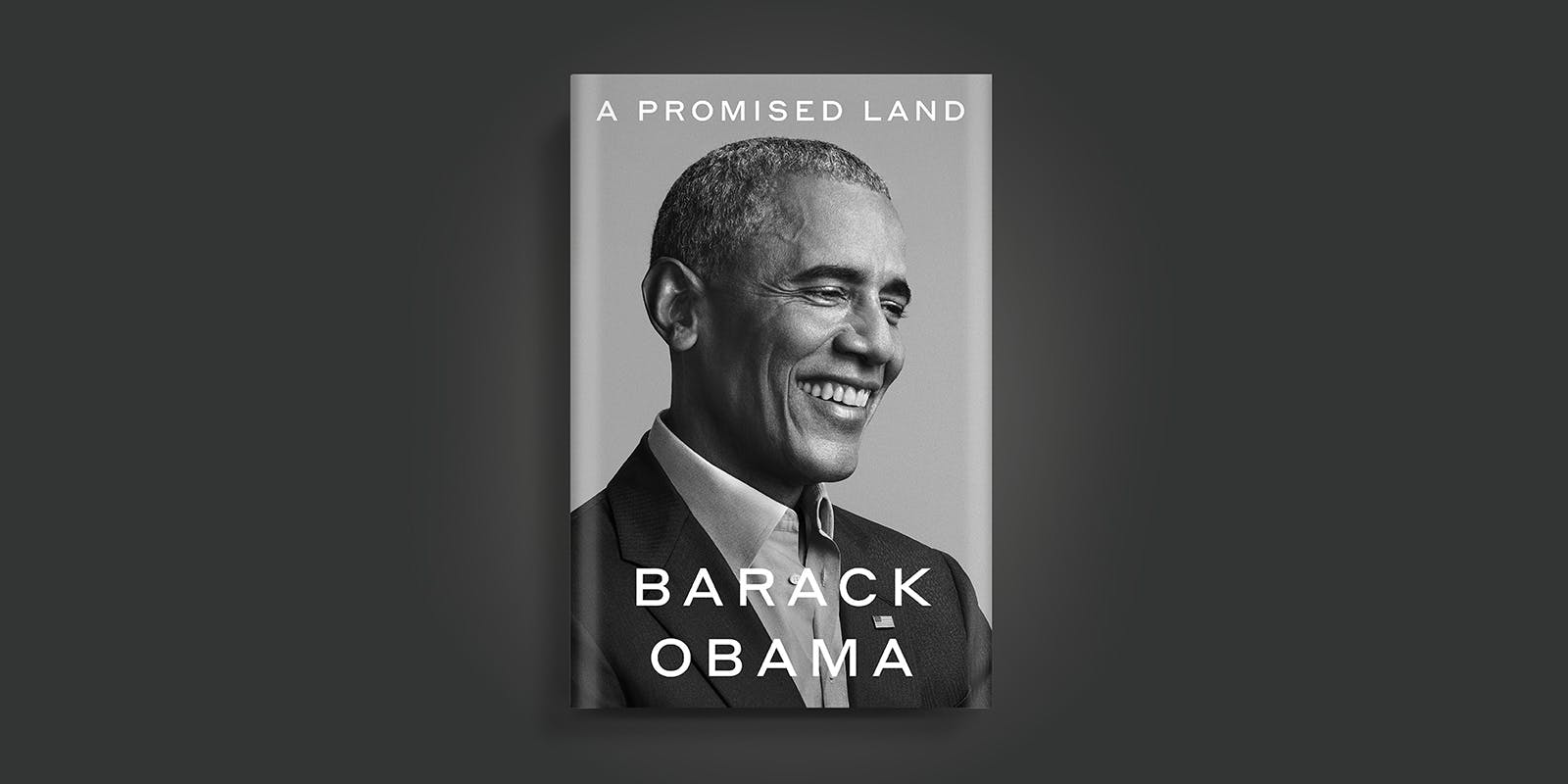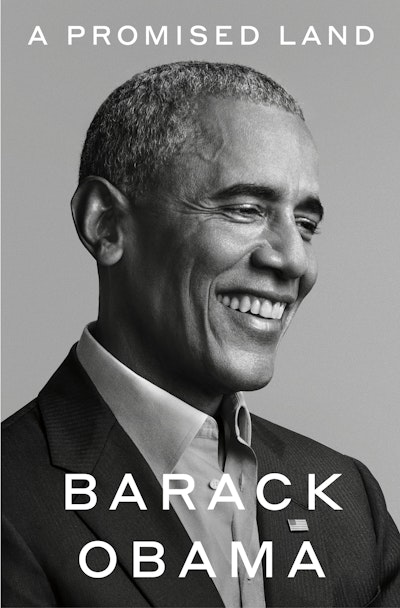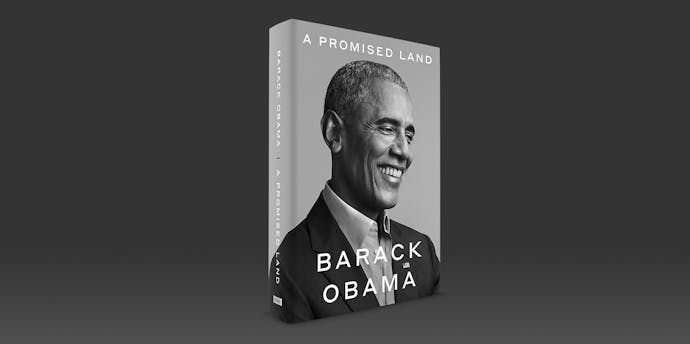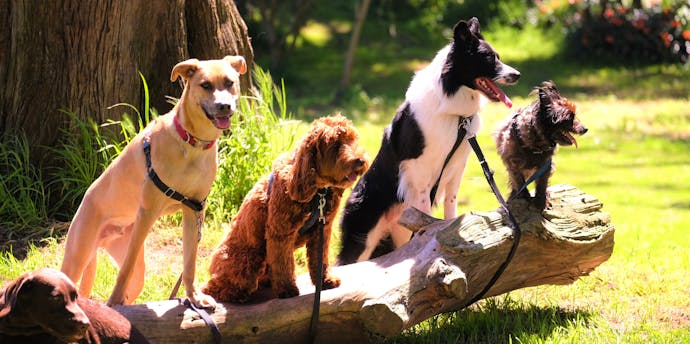Settle in for a memorable reading group discussion, with Barack Obama’s long-awaited memoirs: A Promised Land.
‘Looking back, I sometimes ponder the age-old question of how much difference the particular characteristics of individual leaders make in the sweep of history – whether those of us who rise to power are mere conduits for the deep, relentless currents of the times or whether we’re at least partly the authors of what’s come.’ – Barack Obama
Ponder this question and many more at your next book club get-together. Here are some discussion points to get your A Promised Land conversation started.
Discussion points and questions:
- What did you find most inspiring or unexpected about President Obama’s A Promised Land? Which parts resonated or surprised you most? How did this book differ from other presidential memoirs or chronicles by public figures you have read?
- As a young man, President Obama had a complex view of America informed by his sense of idealism. Even after a career in politics, he still believes in America’s promise. What parts of his upbringing formed this belief? How does he view that promise today, on the other side of his presidency? What does the book’s title – A Promised Land – mean to you?
- President Obama talks about an early conflict in his life – ‘between working for change within the system and pushing against it; wanting to lead but wanting to empower people to make change for themselves; wanting to be in politics but not of it.’ Have you or anyone you have known had similar struggles? How were those struggles reconciled, if at all? Can these push-pull forces remain present in a productive life? How do you negotiate this tension in your own life?
- The president discovered a love of books when he was still in high school, reading everything from Ralph Ellison to Dostoyevsky. He likens it to being a tinkerer, convinced it would ‘prove handy once I figured out the nature of my calling.’ What are some of the most meaningful books you’ve read that may have laid the groundwork for important moments in your life or that have changed how you view the world?
- In describing how his political career started, President Obama explains that, ‘it was only by hitching my wagon to something larger than myself that I was ultimately able to locate a community and purpose for my life.’ What issues or causes give you a sense of purpose in your life? How do you translate that sense of purpose into action within your community?
- Early on in their relationship, Michelle says to Barack, ‘Have you ever noticed that if there’s a hard way and an easy way, you choose the hard way every time? Why do you think that is?’ What are your definitions of ‘the hard way’ and ‘the easy way’? What do you see as the value of taking ‘the hard way’?
- The keynote address of the 2004 Democratic National Convention launched then-senator Obama onto the national stage. The magical ‘current of emotion’ between the speaker and the crowd tapped into a collective spirit and brought about ‘a giant swell of possibility.’ Describe President Obama’s life before and after this moment. What do you remember about his speech?
- How did you feel as President Obama wrestled with the decision to run for president? ‘Whatever the nature of my faith, I couldn’t take refuge in the notion of God calling me to run for president. I couldn’t pretend to be simply responding to some invisible pull of the universe. I couldn’t claim I was indispensable to the cause of freedom and justice, or deny responsibility for the burden I’d be placing on my family.’ What significant personal or professional decisions have you grappled with that have affected others close to you?
- When President Obama announced his candidacy in Springfield, Illinois, in 2007, the themes of his speech were ‘the need for fundamental change; the need to tackle long-term problems like healthcare and climate change; the need to move past the tired Washington divide; the need for an engaged and active citizenry.’ Which of these issues was most important to you? Which issues did President Obama move the needle on, and which still need to be addressed? What work have you done to be part of ‘an engaged and active citizenry’?
- Running for office is a serious business that comes with its own set of rules. What about the campaign – the advice President Obama got from people like David Axelrod and Robert Gibbs – most intrigued you? Did your view about how campaigns should play out change? How do you think candidate Obama was able to find balance between the kind of campaign he wanted to run and the kind of tried-and-true strategy that would help him win?
- In writing A Promised Land, President Obama wanted to give readers a real sense of what it’s like to be the president of the United States, to remind us that the presidency is ultimately just a job and that working in the White House brings the same daily mix of satisfaction, disappointment, friction, and small triumphs that ordinary citizens face. Did your understanding of ‘the job’ of being president change? What do you think are the most difficult aspects of the job? Which are most rewarding? What aspects of living and working in the White House surprised you the most?
- The first few weeks of Barack Obama’s presidency saw him dealing with several crises needing immediate attention – an economy in turmoil, the Iraq War. And while every person who has held the office of president would say nothing prepares you for it, what attributes do you think President Obama relied on to weather these storms? What resources did he look to for guidance?
- While in office, President Obama made a point of reading mail from ordinary people every night. Why do you think he felt it was important for him to do this? If you were writing a letter to President Obama, what would you say?
- Besides reading mail from citizens, what were some other ways that President Obama sought to stay connected to the experiences and struggles of ordinary people? What helped him to remain grounded despite all the trappings of grandeur that come with being president of the United States?
- President Obama takes ‘pride in having built a culture – both during the campaign and inside the White House – where we didn’t go looking for scapegoats when things went south.’ This echoes the sentiments of President Harry S Truman’s motto ‘The buck stops here!’ What leadership qualities do you find most admirable? How do you define leadership, especially in terms of the presidency?
- In describing the qualities that make up true leadership, President Obama writes that ‘awareness of custom and ritual matter’ and ‘symbols, protocol, and body language matter.’ Why do you think these qualities are so important to him? What role does respect of customs, symbols, protocol, and body language play in a functioning democracy?
- During his presidency, President Obama considered the differing perspectives of those who stood in stark contrast to him on political and economic issues. What purpose did this serve? How can listening to differing viewpoints help one make better decisions?
- When President Obama entered the Oval Office he had many pressing foreign policy issues that needed attention – the wars in Iraq and Afghanistan, the threats of terrorism, climate change, the international fallout from the financial crisis. What do you think America’s role in the world should be? Do you think engaging with other countries, both allies and adversaries, is in America’s national interest? If so, why? What are the dangers of isolating ourselves?
- With his first twenty-two-member cabinet, including seven women and ten minorities, President Obama assembled the most diverse White House staff in history. Why do you think it was so important for him to break from tradition in this way?
- Despite having the most diverse staff in American history, even the president admits that he was blind to the frustrations of his non-white, non-male staffers – women being interrupted and having their comments being repeated by men as if for the first time. Have you encountered or witnessed similar disparities in the workplace?
- The process of shepherding the Dodd-Frank financial reform bill through Congress, and having to meet the filibuster-proof threshold of sixty votes in the Senate, presented a major challenge to the Obama administration, especially since senators added amendments, carving out loopholes for a ‘smorgasbord of interests – the insurance industry, real estate investments, trusts, and on and on,’ which compelled President Obama to think ‘at times, I felt like the fisherman in Hemingway’s The Old Man and the Sea, sharks gnawing at my catch as I tried to tow it to shore.’ What are your thoughts on how legislation is made? Should the filibuster be abolished, or modified? If so, how would you rather see the law-making process work?
- ‘The chance to work closely with the men and women of the US armed forces – to witness firsthand their teamwork and sense of duty – had been one of the most humbling aspects of my two years in office,’ President Obama notes, as he mulls over the raid on Osama bin Laden’s compound. How do you honour our men and women in uniform? Do you think our country does enough to support military families? If not, what are ways we can bring back the feeling of shared burden and sacrifice?
- Did you have a perception of an issue – foreign or domestic – that was changed once you heard the behind-the-scenes story? Which one? How do you see it now having this insight?
- Becoming the first Black president of the United States, Barack Obama filled many Americans with a sense of pride and progress. But for others, he felt as if his very presence in the White House, ‘had triggered a sense that the natural order had been disrupted.’ The concept of ‘birtherism’ reemerges, amplified by the media. Talk about this duality of race – in which President Obama inspires hope in some and fear in others. Through the lens of race, did you gain new insights to the unique challenges that marked his presidency?
- Being a political spouse is no easy job. Michelle Obama made it clear early on that she wanted little to do with her husband’s Senate campaign, and she insisted on maintaining reasonable but firm boundaries during the presidential campaign and her time as First Lady. In what ways do Barack and Michelle Obama support each other and balance each other out?
- President Obama warmly reflects on fatherhood throughout the memoir. Sasha and Malia have had a unique upbringing. How did the president and the First Lady try to ensure that their daughters had as normal a childhood as possible?
- President Obama moves through his campaigns and presidential term – and indeed this very book – hoping to reach a younger generation, to inspire them into service, whether in their community or in politics. In what ways are you currently of service? What paths of activism or opportunities might you be considering since reading A Promised Land?
- President Obama has said that democracy is not just something handed down to us, but rather something we actively create together. Can you think of any examples of how citizen engagement has resulted in meaningful social change in America?
- How did you feel at the end of A Promised Land?













